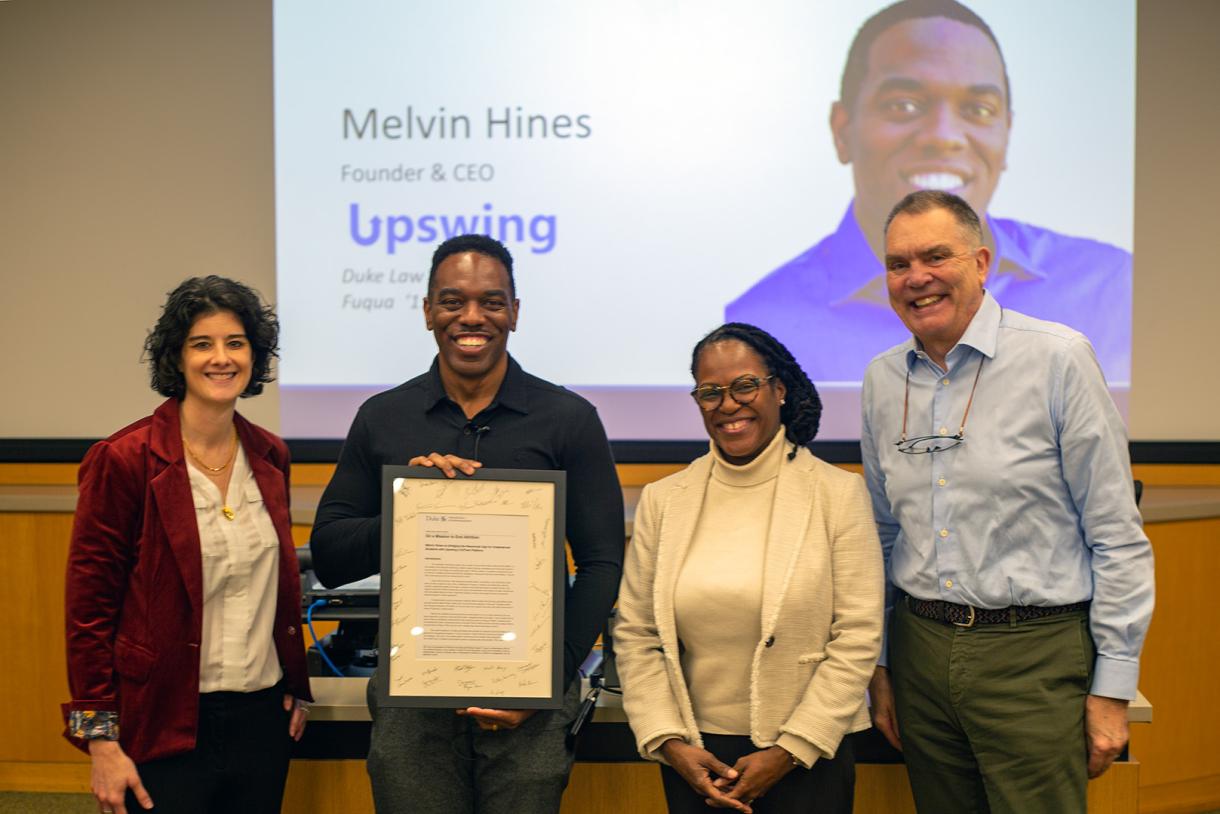
Every founder has experienced challenges along their entrepreneurial journey—but most founders wouldn’t opt to rehash them in a classroom packed with business students. Yet that’s just what Melvin Hines JD ’09, MBA ’11 volunteered to do when he joined Duke Executive MBA students in their Entrepreneurial Education course.
Hines is the co-founder and CEO of Upswing, which provides resources to improve student retention for first-generation college students, adult learners, military veterans, parents, and all others who need support. Hines joined the class to discuss a Duke Innovation & Entrepreneurship (Duke I&E) case study highlighting his entrepreneurial journey and lessons learned in funding, hiring, scaling, and more.

The case delved into Hines’ personal background and motivation—out of 250 students in his high school class in Albany, Georgia, Hines was one of only 68 to graduate—before taking students step by step through Upswing’s formation and growth, focusing on pivotal benchmarks and decisions.
“Hearing candid stories from founders like Melvin is invaluable for students who are considering building or joining startups,” said Jamie Jones, director of Duke I&E. “Cases guide students to consider real business dilemmas—with real organizational, industry, and societal context—through the lens of a story that makes these dilemmas and decisions much more tangible and memorable.”
“The Upswing case study demonstrated how hard it is to cultivate and maintain company culture in a growing organization,” said Jennifer Arrington MBA ’23, a student in the class. “It highlighted the hard road that the team had to travel in pursuit of their mission, and [Hines’] thoughtfulness and perseverance.”

“The Upswing case provided several great examples of the strategies and challenges related to hiring and performance management throughout the various stages of growth of a startup,” said Forgan Elmubarak MBA ’23. “It was a very practical case, and having Melvin attend in person to talk more about his company and the great work they do was both insightful and inspirational.”
Jones added, “Not only did Melvin show our students the importance of having clearly articulated values when it comes to making those inevitable hard choices in business—he also demonstrated the Duke entrepreneurship network’s spirit of generosity and collaboration in sharing his time, experience, and insights with us.”
Hines spoke with Duke I&E about the case and what he hopes students will learn from his experiences:
How did it feel to have your experience founding and scaling Upswing documented in a case?
It was a certainly a trip down memory lane. I can say for sure that the entrepreneurial experience has changed me, so reading about the challenges and choices felt as “third-person” to me as I’m sure it felt to the students in the class. There is just so much more that I know now than I did back in 2014.
What motivated you to share your experience in this format, and what do you hope students took away from the case and from their session with you?
I honestly wasn’t sure if it would be interesting or valuable to students or not. It’s hard to be objective about your own life experiences. But I do hope that the main takeaway students received was that regardless of what they read, hear, or see in movies, there is no special formula for operating a successful startup. Every choice has consequences, many of the choices you make are the best among bad options, and so you can’t get paralyzed or caught up in making the perfect decision. You have to decide, fail, learn from that failure, and keep going.
What do you consider the most valuable lesson you’ve learned along your entrepreneurial path? Can new entrepreneurs learn this without experiencing it for themselves?
Entrepreneurship certainly has indescribable highs, but the lows are just as prominent if not more so. No one but other entrepreneurs will understand that feeling, and in the early days more entrepreneurs will pretend like they aren’t affected. Trust me, everyone is. Being successful in entrepreneurship begins with taking care of yourself first—finding an outlet, having a partner to connect with, joining a founder group, etc. If you don’t take care of yourself, you can’t take care of your team.
How did Duke and the Duke network prepare you for your entrepreneurial journey?
Though it took me looking back to realize this, my two favorite classes were Ashish Arora’s Operations class, and Dan Ariely’s class on Human Behavior. Look at any startup’s income statement, and you’ll see that people are the most expensive asset. So, these classes helped me understand how people are motivated, how processes help people feel better about their jobs, and more.
Howie Rhee gave us our first pitch opportunity out at Google San Francisco, where we learned what it really looks like to be a company. We’ve had several Duke investors, and my original co-founder was my Fuqua roommate. So, I’ve been prepared through a myriad of ways through Duke.
What other advice would you give aspiring founders?
If you don’t come from money, it’s ok to work on building your idea while working full-time. Too many people have been told that’s not the case, or that you just aren’t “all in.” Those same people come from money. It tends to disparately impact minorities and female founders who find themselves desperate for funding and taking terms that won’t be beneficial in the long term—or just not receiving funding at all and having to shut down. Fund your own startup by working while building.